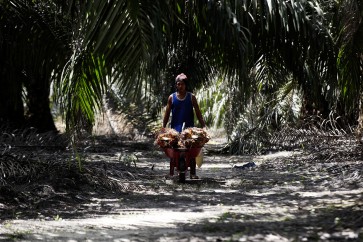Popular Reads
Top Results
Can't find what you're looking for?
View all search resultsPopular Reads
Top Results
Can't find what you're looking for?
View all search resultsEDITORIAL: EU policy unjustifiable
The court ruled last September that Indonesian domestic palm oil prices were not regulated.
Change text size
Gift Premium Articles
to Anyone
W
e find it mind-boggling trying to understand the European Union’s stubborn policy to maintain the 2013 anti-dumping duties on the importation of Indonesian biodiesel, despite a court ruling last year that annulled the duties. The court ruled last September that Indonesian domestic palm oil prices were not regulated.
The dumping complaint only validates our suspicion that the seemingly endless attacks on palm oil by green NGOs and consumer organizations since the late 1990s have partly been prompted by strong lobbying by the EU vegetable oil industry to weaken the competitiveness of Indonesian palm oil. Hence, the government’s decision to file next week a complaint at the Geneva-based World Trade Organization against the EU anti-dumping duties is imperative.
Palm oil, which now accounts for almost 50 percent of global vegetable oil consumption, has increasingly been leading the market as a result of its high competitiveness. The yield of oil palm trees per hectare is nine times higher than soybeans, five times that of rapeseed and eight times that of sunflowers.
Indonesia is now the world’s largest palm oil producer supplying over 26 million tons of palm oil-based products to the global market annually. In fact, the EU has been one of the largest importers, taking up to 15 percent of Indonesian exports, although the palm oil industry has constantly been the target of international green NGOs and consumer organizations.
Even though significant improvements have been made in the environmental and social and labor management of the industry under the Indonesian Sustainable Palm Oil (ISPO) scheme, the industry remains stigmatized as a “sinner.” Its latest sin is the alleged dumping practiced by Indonesian biodiesel exporters, which prompted the EU in November 2013 to slap anti-dumping duties of between 8.8 percent and 20.5 percent. Indonesian exports slumped from US$983 million in 2012 to $30 million in 2016 as a result.
The General Court of the EU annulled last September the anti-dumping duties, saying that palm oil prices were not regulated in Indonesia, but the EU Council appealed the decision. Export taxes have indeed been imposed on CPO to move up the raw commodity on the value-added ladder and to enhance the development of biofuels like biodiesel in a bid to curb fossil fuel use and consequently reduce carbon emissions.
As palm oil has developed as one of the biggest nonoil exports from Indonesia and since 40 percent of the estimated 11 million hectares of oil palm estates is owned by smallholders, it is high time for Indonesia and the EU to resolve the social, environmental and economic issues surrounding the industry.


















